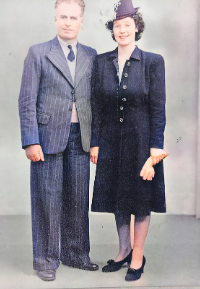
Irish postmistress Maureen Flavin Sweeney is a prime example of an ordinary individual who changed the course of history.
Born on June 3, 1923, Flavin Sweeney was raised in Knockanure, County Kerry, Ireland, where her parents ran a general store. In 1942, while World War II raged in Europe, she moved to Blacksod, County Mayo, on the West Ireland coast, taking a position as a clerk in the local post office. Her job included recording and transmitting weather data, but Flavin Sweeney did not know precisely where her reports were going — or the influence they would have on history.
As it happens, Flavin Sweeney’s reports were being sent to the Allied Forces. Despite its formal neutrality, Ireland aided the Allied war effort in many ways, including by sharing weather reports with Great Britain. Blacksod, where Flavin Sweeney worked, was especially critical to those weather reports — its position on the northwestern edge of Ireland gave it an early glimpse of the weather conditions headed toward Great Britain.
In the early morning of June 3, 1944 (which also happened to be Flavin Sweeney’s 21st birthday), she woke at 1 a.m. to take her typical hourly weather reading. Though she did not know it, this report would be critical — in two days, the Allied forces were planning to invade Normandy, France, in an operation dubbed “Overlord,” but commonly called “D-Day.” The largest amphibious invasion in history, it would be the beginning of an ambitious campaign to defeat Nazi Germany and free Europe. Its success was crucial for Allied forces.
Flavin Sweeney’s report on the morning of June 3 showed a drop in air pressure, indicating that a severe storm was coming. This would have posed a serious threat to the Normandy invasion, particularly making it difficult to cross the English channel. After sending a report about the weather, Flavin Sweeney received a series of odd phone calls; a woman with an English accent urged her to “Please check. Please repeat!” She confirmed her report with the postmistress’ son and lighthouse keeper, Ted Sweeney, and sent it to British officials.
Hours later, Royal Air Force officer James Stagg, a British military meteorologist, advised the U.S. General Dwight D. Eisenhower to postpone the invasion, citing Flavin Sweeney’s report. Eisenhower agreed, delaying the invasion by 24 hours to June 6, 1944. This decision, motivated by Flavin Sweeney’s report, likely saved lives; some commentators have said the invasion may have failed if it went forward on June 5, as planned.
Flavin Sweeney did not learn of her report’s role in delaying the Normandy invasion until years later. In 1946, she married lighthouse keeper Ted Sweeney, with whom she had confirmed her critical weather report. She worked as the postmistress of Blacksod until she retired in the early 2000s. In June 2021, she received a medal from the U.S. Congress, honored for her skill and role in the Allied effort. Maureen Flavin Sweeney died on Dec. 17, 2023, at 100 years old.
When referring to her role in delaying the invasion, Flavin Sweeney said in an interview, “They could arrange everything, but they couldn’t prearrange the weather… We eventually had the final say.”













